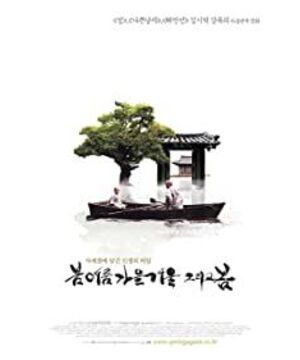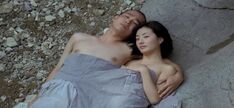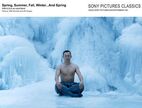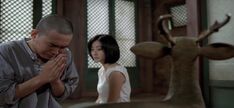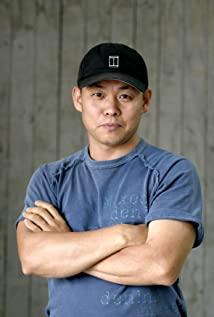Buddhism is a clean place, not like a home, where there are mountains and waters. So why does this Buddhist temple live in the valley water?
The Daxiong Hall is mostly located in the center of the temple, on top of a strong high platform, why the water overflows under the steps and floats in the pool?
The temple has no walls but a courtyard door, and the temple has no screen but a room door. Old monks and young monks can only go in and out of the door, regardless of other places. Buddhism pays attention to being strong when there is no desire, whether it is a door or a wall, it is one form in all things, and the pure heart is not limited to this. There is a method, but no heart wall.
But the first time the little monk was no longer confined to the door wall, it was when he saw the female donor at night. Desire is permeated, but there is no door or wall in the heart.
The pool where the temple is located is like a pool of water of desire, four-level conversion. The water rises in summer, freezes in winter, and the tide rises and falls, just like the road of life, discovering, pursuing, possessing, and losing. In spring, the little monk went up to the mountain to collect medicine, and the pool water was lower than the mountain gate. In summer, love begins to open, and human desires are hard to suppress, and there is no mountain gate in the water. The gate and the ancient trees are all hints of the depth of the pool.
The little monk hits the oars in the pool and circulates, it is entangled in desire, and finally jumped out of the pool, and the female donor also dragged down the pool of desire.
Youth, love, sex, these are godsends, there is nothing wrong with them, just like the old monk said, "it is also human nature", and even deliberately promised them. But the most complicated and painful source in the world is the possession, greed, and selfishness that arise from objective natural things such as love, sex, wealth, success, and so on. These desires are also innate to human beings, and they are also the objects that humans hope to overcome, so as to reduce their own and social pain.
When the old monk decided to send away the female benefactor, the young monk ran away from the temple because of his infatuation with love and sex. Perhaps all these choices are doomed to the final result. As the old monk said: "Lust awakens the desire to possess, which will lead to killing."
Imagine the pain and sin in the world, all of which come from this. But, how many people can grasp the measure? Whether to adjust it? Even if the little monk regrets after the prison disaster, it is only a moment of peace in the painful life of an individual, and as a human being, it blooms again like spring buds and summer flowers, filled with water of desire.
Perhaps from the director's point of view, just as children play with little creatures for fun. The birth, aging, sickness and death of life are like the rotation of the four seasons, which is the law of heaven, and the burden of desire in life cannot escape the will of heaven after all.
———
Dawkins said in the book "The Selfish Gene" that "people are actually carriers of genes, and slaves of genes". In religious philosophy, perhaps it is reincarnation and original sin. No one can escape humanity and desire.
View more about Spring, Summer, Fall, Winter... and Spring reviews


